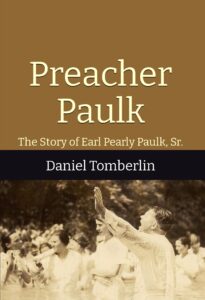Prayer is an exercise in theology and the language of prayer is the vocabulary of theology. Even so, we must acknowledge that the infinite and perfect God cannot be fully known by finite human language. We must acknowledge the mysterious and apophatic nature of God. Prayer places us in a posture of bowing down while looking up in wonder. The act of prayer is to acknowledge that God is. As we encounter God in the language of prayer and the place of worship, we are compelled to engage the mystery of the Holy One who is wholly other, uncreated, self-existent and omnipresent. As we step into that holy place we are at once terrified and at peace, overwhelmed by the omnipresent One. To “see” God is to fall “like a dead man” (to be slain in the Spirit?!) (Revelation 1:17; cf. Ex. 33:20).
When We Stumble and Fall
The steps of a man are established by the Lord, and He delights in his way. When he falls, he will not be hurled down, because the Lord is the One who holds his hand (Psalm 37:23-24 NASB).
In November of 2021, I traveled to Phoenix, Arizona to conduct a pastor’s seminar for the Southwestern Hispanic Region of the Church of God. I awakened early Saturday morning, November 21, and decided to go for a run. I was staying in a hotel near a medical center with paved sidewalks that were well lighted. I was about two miles into my run when I tripped and fell flat on my face. It happened so fast that I couldn’t catch myself. My face and knees were bloodied.

A Word from the Lord: A Revelational Model of Pentecostal Healing
A revelational model is informed by Paul’s teaching on the spiritual gifts in 1 Corinthians 12:8-11. In this model, God reveals information through the word of knowledge to the minister about a suffering person so that the minister can intercede.[1] The “word of knowledge” (1 Corinthians 12:8) is a spiritual gift of revelation – knowing by the Spirit.
Continue reading “A Word from the Lord: A Revelational Model of Pentecostal Healing”
Why Pray for Healing?
Prayer is theology in action. Prayer is a means of grace in that the Holy Spirit moves in our heart so that we may cry out to God. Prayer is prevenient grace in that when we don’t know how or what to pray, the Spirit intercedes for us (Rom. 8:26). Likewise, we pray according to what and how we believe. If we believe in error, or practice wrongly, that will have a negative effect in how we pray (Jas. 4:3). Even so, God’s prevenient grace is evident in that faith is a gift of God to unbelievers and believers. We pray as an exercise of faith, and sometimes we pray when we have little to no faith, but God graciously responds (Mark 9:24).
The Legacy of Earl Pearly Paulk, Sr.
New Book – “Preacher Paulk”
UPDATE: Preacher Paulk has been selected by the Church of God Historical Commission as winner of the 2024 Charles W. Conn Historical Writing Award! Click here to read.
Earl Pearly Paulk was a pioneering Pentecostal leader whose ministry spanned five decades, serving the Church of God as an evangelist, pastor, state overseer, and denominational executive. He was renowned as one of the finest Pentecostal preachers in the movement. As a scholar of the Holy Scriptures, he influenced the doctrine of the Church of God and was a leading apologist for Pentecostalism. He was among the best of his generation, and a hero to the next generation. If one wishes to understand the development of Pentecostalism, then one needs to know Earl Pearly Paulk.
Available in Hardcover and Softcover from Amazon.
Earl Pearly Paulk was a pioneering Pentecostal leader whose ministry spanned five decades, serving the Church of God as an evangelist, pastor, state overseer, and denominational executive He was renowned as one of the finest Pentecostal preachers in the movement. As a scholar of the Holy Scriptures, he influenced the doctrine of the Church of God and was a leading apologist for Pentecostalism. He was among the best of his generation, and a hero to the next generation. If one wishes to understand the development of Pentecostalism, then one needs to know Earl Pearly Paulk.
Vincent of Lerins: The Commonitorium
Vincent of Lérins (c. 390-450 CE) was a fifth century monk, presbyter, and theologian. Vincent’s concern was straightforward. How can we discern between truth and heresy? How can we properly read Holy Scripture? To this end, Vincent wrote the Commonitorium. Vincent is the first to present a systematic treatment on Scripture and Tradition as a theological method.

